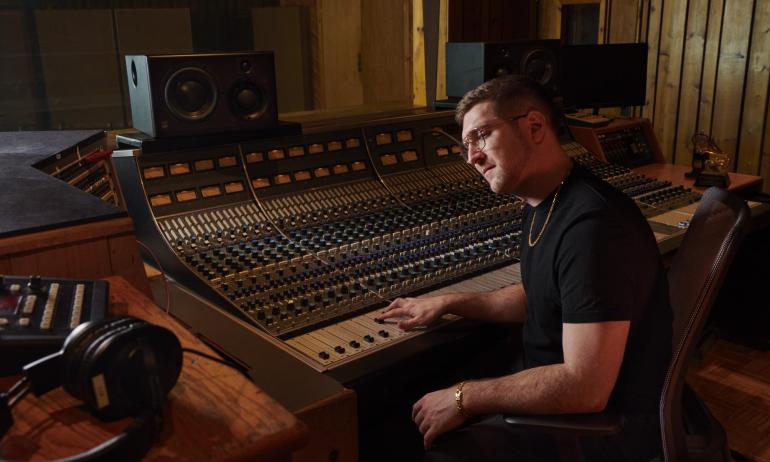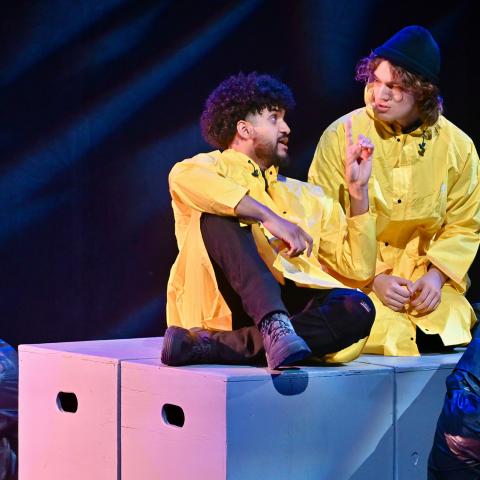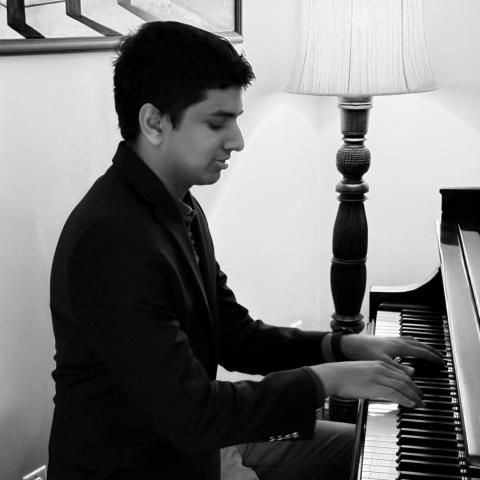What Makes a Song of the Summer?

Beyoncé’s latest single, “Break My Soul,” is an early contender for this year's song of the summer.
Image by Nat Ch Villa/Wikimedia Commons
“Crazy in Love.” “Despacito." "Butter."
What makes a song a Song of the Summer? Is it the music? The lyrics? The emotions that the song evokes?
“For me, it’s always been the feeling," says Sarah Brindell, an associate professor in Berklee’s Songwriting Department. “The feeling is first and that’s not something that we can define even with words. The most beautiful moments of your favorite movie and the part that makes you cry the most is usually when the words go away and there’s only music, and then we’re all crying. When there’s words, we’re listening and trying to be a part of the movie. As soon as the music swells, that’s when everybody is crying.”

Sarah Brindell
Image courtesy of the artist
A professional musician for more than 20 years, Brindell has shared the stage and studio with some of music’s biggest stars, such as Grammy Award–winning artists Norah Jones and Carole King, and has released five records, including her most recent EP, 2021's Songs from the Heart. She was a finalist in Billboard’s World Song Contest and the Song of the Year contest supporting VH1’s Save the Music Foundation, and her songs have been featured on several television shows, including MTV’s Made. Brindell and her husband recently founded a five-day songwriting and production workshop at the Alpha Institute in Kingston, Jamaica, which is set to launch in July of 2023.
We spoke to Brindell about what elements make a true song of summer. The interview has been condensed for clarity and length.
What do you think makes a song “a song of the summer”? Are there specific elements that contribute to that?
This is an interesting question. A song of the summer, I think, is a subjective term. In thinking about it, it has to have an element of nostalgia in it. I actually looked up every single song of the summer for the last 46 years. Insider put out a list of all the different songs that were picked by Billboard. I was looking through the list and I was thinking about it. “When Doves Cry” by Prince is on there. “Every Breath You Take” by the Police is on there. At first, I thought, "Oh, maybe it’s a fast tempo; maybe that’s what has to be but not always." It needs to be upbeat but chill, and accessible across many different demographics; something that everybody can groove to or get into. I think that’s really important. Elements of lyrics that are vulnerable or nostalgic or also anticipatory. I think summer is a lot about anticipation.
I would say my contenders for the song of the summer this year are “As It Was” by Harry Styles and “About Damn Time” by Lizzo. Disco is super cool right now. This is hilarious for me because I won’t even tell you how many times disco has come back into style during my life. It really is back with a vengeance in the last couple of years. Listening to “About Damn Time” was a super kind of throwback, borrowing elements from disco. It also has that kind of chill-yet-up-tempo thing about it. It’s got a celebrational vibe, which is also something that happens quite a bit in a song of the summer, even if it's a celebration of pain or heartache. I think that there’s some kind of element of "we’re celebrating a moment that we know is fleeting."
Several of the songs on the Billboard list of song of the summer candidates lean towards Top 40, pop, and contemporary hits. Are there specific genres of music that make them more likely to fit this description?
I’m not sure that a little bit more niche styles may ever be included in that category if you’re looking at Billboard. However, I think that songs cross genres and, as an instructor and an influencer in the songwriting world, I have a hard time continuing the conversation about genre because I feel like it really ties in with appropriation of race, of gender, of all these things. It’s unfortunate to me that they’re so tied in with each other, but they are. I’m actually looking to sort of move past the need for genre and the categorization of music even though I know that’s not marketable. The trend anyway from my students and many people that I’ve spoken to is: “We’re trying to cross genres. We’re trying to move past genres. We’re trying to define something new that’s more fluid and less attached to what it was before.” Getting back to the days of Woodstock 1969, when there were all different kinds of artists on that stage, all different races, and it kind of just seems to me like, that’s what I want it to be, so if I’m an influencer in all of this, it’s hard for me to speak to genre right now.
With that in mind, what do you think of Kate Bush’s “Running Up That Hill” having a resurgence, and why do you think it’s resonating with so many different people?
It helps that it came back on Stranger Things. Now we have this accessibility towards it that we didn’t before because it’s been synced with that show. The fact that now all of the audience of Stranger Things is also listening to it and it’s in association with a very crazy theme in the show that was really exciting, that’s of course going to be a bump in the audience. Now there’s a new generation that has never heard that song before, along with an older generation that is feeling nostalgic about that song because they remember when it came out. That’s pretty fun and that reaches a larger audience of course. Talk about anticipating. You look up the lyrics and there’s all kinds of analyses into the meaning of that song, which is cool. It’s very vulnerable. This song feels really incredibly naked and raw in terms of the lyric development:
It doesn’t hurt me
Do you want to feel how it feels?
[Brindell] That’s how it starts, with a real introductory feeling, but there’s a sense of super vulnerability in the words.
Do you want to know, know it doesn’t hurt me?
Do you want to hear about the deal that I’m making?
You, it’s you and me
And if I only could
I’d make a deal with God
And I’d get him to swap our places
Be running up that road
So that’s so interesting because “running up that road, the running up that hill, running up that building,” I think, is the central metaphor of the song. I don’t want to say, "Oh, this is what the song is about," because everybody should interpret the song in their own way. That’s the beauty of accessible lyrics; they may be very specific. There are interesting nouns and verbs in here that are very, very specific but also accessible—“tearing you,” “thunder”—that give us a picture in our minds as we’re listening and creates a sense of, "I feel that too." There’s usually a central metaphor intact in great songwriting in general, and often in the song of summer there’s some kind of central metaphor or symbol or representation of what the emotion or feeling is of the song. So, the “running up that road” is that.
As a songwriting professor, is there one thing you want your students to learn and to take away from the class?
There’s thousands of things. It’s hard to name one. I would say that what I really want them to get out of their time with me is a sense of prolific forward motion with their writing. Just continual writing. I want all my students to take my classes and step away feeling they have more tools, more ways that they can express themselves and they’re inspired to do so, and they continue with the writing practice. If I can do that for my students and make them more excited about writing their songs after they take the class than before, then I’ve done my job.
In terms of timing, do you think it’s a conscious effort by record companies to release songs they think will be songs of the summer, or is it more organic?
I don’t think they pay enough attention sometimes, because honestly I’m hearing lyrics like “feel the warmth" and "basking in the warm sun” and [those] things are being released in December. I think possibly they could pay more attention to what the song is about, and if there’s potential ones on the album that are like, “that’s the hit...that’s the one that is going to bowl everyone over,” then looking to space the timing out a little bit more. I think it ends up being more organic, and so often possibly the content of the lyrics or the music and the vibe of the music maybe aren't being taken into consideration enough.
Have you heard Beyoncé's "Break My Soul," and do you think it could be the song of the summer?
Wow, this song is a super ’90s throwback with the relentless main rhythm part and four-on-the-floor kick drum. Kinda early house music/EDM-esque. Nice chord progression in the development section. I'm not sure the melodic hook is strong enough for a song of the summer, but the lyric, "You won't break my soul," is definitely helping me cope with all the soul-crushing news we've been dealing with as of late.




